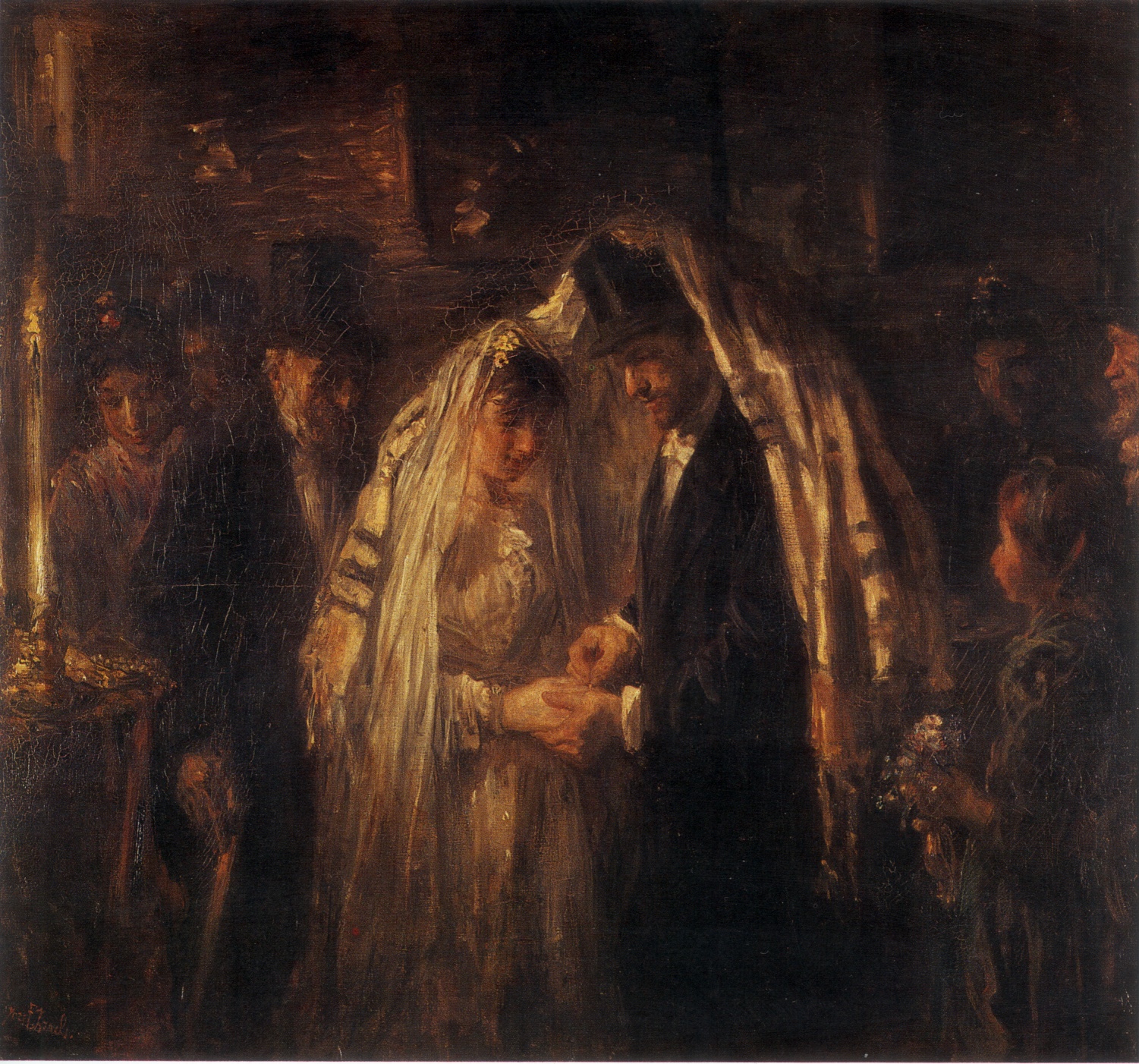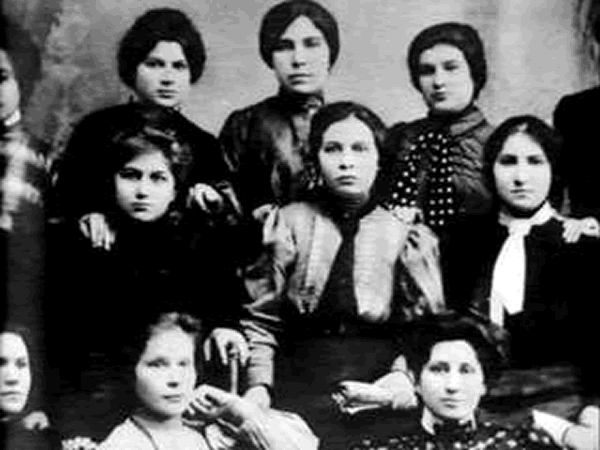==Marriage== Since most Jews living in the shtetls of Poland, Russia and Ukraine in the 19th century generally adhered to their religious principles, family was considered to be the basic unit of culture and lifestyle. Since the Torah taught to “…be fruitful and multiply and fill the land…“, marriage and child rearing was sacred and an obligatory act for every Jew. An unmarried man was called a “nothing” and an unmarried woman was not a “real woman”, as far as society was concerned. Unmarried women were shunned harshly by Judaism, since the only way for a woman to each God is through her husband. An unmarried woman therefore, would be miserable herself since she was told she could not communicate with God and would not go to heaven.

Jewish Wedding ((http://upload.wikimedia.org/wikipedia/commons/7/79/Israëls-A_Jewish_Wedding-1903.jpg))
Although it is the parent’s responsibility to marry off their daughters, every marriage match is considered to be pre-made in heaven. It is simply the human’s job to try to carry out God’s will the best they can. For this reason, every village has a shidduch—a matchmaker—who has an entire system for finding fitting marriage matches. The three essential variables by which couples are chosen are learning, distinguished ancestry and money. Balance, as prescribed by the Torah, must also be present. This means that an appropriate wife for a scholar would be a lady with a large dowry. In addition, the old shouldn’t marry the young, nor the learned the ignorant. Due to the multitude of rules to follow, marriage matches may take years to become final. Approval of the marriage by family members is also a crucial part.
Although divorce is frowned upon, it is allowed. The man has full rights to divorce his wife if she hadn’t produced a child in ten years. Although it is more difficult for a woman to divorce her husband, it IS possible.
Jewish Scholar ((http://blufiles.storage.live.com/y1pqbn34G7tWUW7ma-MdHzGF6SVkfNr53j_tfjvRvKdzFflpmEuZIRZe_uSAyiqegHq))
==Gender Roles==The gender roles of a stereotypical Jewish family are clearly divided. The optimal position for a man is to become a religious scholar and become even closer to God. Parents of young boys almost always made them go to a yeshiva, in the hopes that their son will make his family and village proud by becoming a scholar. Because of their prestige and status, scholar husbands and fathers had little obligations inside the home. The men who did become scholars however—the ”prostehs”—worked side by side with their wives in running the family business or taking care of the children.
Women certainly did not enjoy all the privileges the society men did. Girls usually went to a kheyder, where they learned basic Yiddish. Education beyond the very basics of academics was considered unfeminine and the woman was said to have a “man’s head”. As a result of a lack of Hebrew education, women read a special edition of the Torah, written in Yiddish. They also enjoyed many secular books in Yiddish, which were quite popular among the female population of shtetls, although rare. The wives of learned men had it hardest of all, and naturally they were considered to be essential to the society. They cooked, cleaned, and performed every other household task imaginable, reared the children and many were the primary source for their family’s income. Some ran businesses or sold goods at a market, or even worked at home—anything to bring in an acceptable income. Despite the many responsibilities of women, they were nevertheless considered inferior and their ultimate prior was to serve their husband—a perennial student.

Jewish Women ((http://www.eilatgordinlevitan.com/dvinsk/dv_pix/030306_71_b.gif))
==Back to Adam and Eve==These gender roles can be dated to the story of Adam and Eve, where Eve was always considered inferior since she was made from bone and Adam was made from soil. From this story comes the explanation for women’s apparent need of maintenance, their temper and tendency to hold grudges. The separation of genders is also reflected in the morning prayers of men and women. While the women thank God that he has made them according to his will, the men thank God that he has not made them women. Despite the irony, both sides are happy with the roles they have been given by God. Men and women according to the story of Adam and Eve:
“Women need perfume, while men do not; dust of the ground remains the same no matter how long it is kept; flesh, however, requires salt to keep it in good condition”
“The voice of women is shrill, not so the voice of men; when soft viands are cooked, no sound is heard, but let a bone be put in a pot and at once it crackles”
“A man is easily placated, not so a woman; a few drops of water suffice to soften a clod of earth; a bone stays hard even if it were to soak for days”
==Children==Children in the shtetl were sacred. They are the proof that the couple is fulfilling God’’s will . Children were usually showered with attention during their childhood, especially by the mother. At the appropriate age, however, the paths were split by gender. The primary responsibility of the parents of a girl was to successfully marry her off, while a boy’s parents were more concerned with the child’s education.

Leave a Reply
You have to register to add a comment.